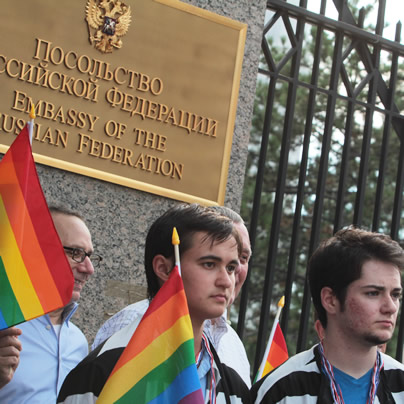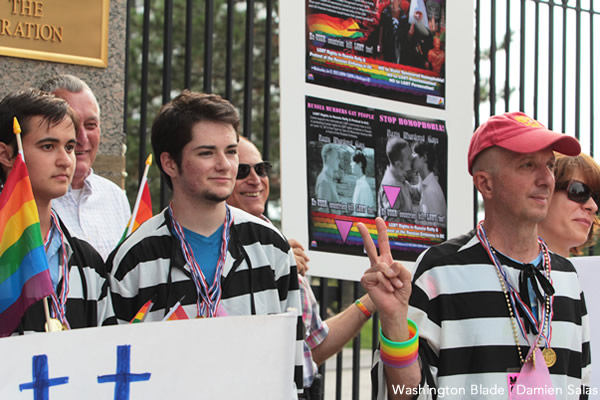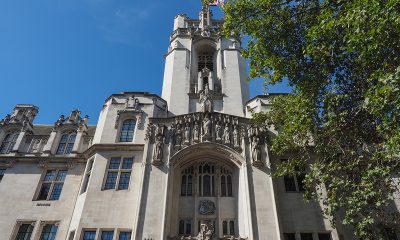News
Russian activist: Gay crackdown seeks to ‘shut down’ advocacy
Polina Andrianova’s group fined 500,000 rubles under “foreign agent” law


Protesters gathered outside of the Russian Embassy on Wednesday, July 31, 2013. (Washington Blade photo by Damien Salas)
“These laws are aimed at driving LGBT people back into silence, back underground, back to the invisibility,” Polina Andrianova of Coming Out, a St. Petersburg-based advocacy group, told the Washington Blade. “That’s the whole point of them.”
Andrianova spoke to the Blade from St. Petersburg after an appellate judge in the city on July 25 overturned a lower court’s ruling that fined Coming Out 500,000 rubles or slightly more than $15,000 for violating a 2012 law that requires groups that receive funding from outside Russia to register as a “foreign agent.”
“We were extremely surprised the appeal judge actually dismissed the decision of the lower court and sent our case back for trial,” she said. “Even though it’s clear we’re not guilty of anything, we did not expect that.”
The Coming Out case comes against the backdrop of growing outrage over Russia’s LGBT rights record.
President Vladimir Putin in late June signed a broadly worded law that bans gay propaganda to minors across the country. A second statute that prohibits foreign same-sex couples and any couple from a country in which gays and lesbians can legally marry from adopting Russian children took effect last month.
Andrianova told the Blade only a handful of people have been charged and found guilty of violating the gay propaganda law. She said the statute’s true impact, however, is felt outside the Russian legal system.
“The propaganda terminology is so vaguely defined that nobody knows what is right or wrong to do,” Andrianova said. “All I know is it has something to do with me being openly gay. If I am on the streets and I hold hands with my girlfriend or kiss my girlfriend — something that any heterosexual couple can do at any time — I’m afraid now that somebody will call the police. Some mother with a child will call the police and the police will arrest me and harass me.”
Authorities in the Russian capital in May arrested 30 people who tried to stage a Pride march outside Moscow City Hall. Police in Murmansk on July 21 arrested four Dutch LGBT rights advocates who were filming a documentary about gay life in Russia.
St. Petersburg police on June 29 took dozens of LGBT rights advocates into custody as they tried to stage their own Pride event.
Andrianova, who did not attend the gathering, told the Blade that several Coming Out volunteers and clients are among the roughly 50 people whom authorities arrested. She said her organization is representing them in court.
Anti-gay laws way for Putin to ‘gain more conservative support’
Andrianova told the Blade she feels the ongoing anti-LGBT crackdown is part of what she described as a “much wider campaign” for Russia to “define itself and define itself in opposition to the West, Europe and the United States.”
“Russia is defining traditional values and Christian orthodox heterosexual values, patriarchal when a man has a role and a woman has a role with a traditional family with kids,” she said. “Gay people, non-Christian orthodox people, all of them are viewed as kind of dangerous to the traditional values of Russia and so they’re viewed as non-Russian and [have] imported values from the West.”
Andrianova added she feels Putin signed the gay propaganda to minors and adoption bans into law as a way to maintain his popularity within the country, especially after protests erupted after the country’s 2012 presidential election the former KGB officer won.
“He got a bit worried about it,” Andrianova said. “He’s trying to gain more conservative support.”
Andrianova blasts Russian sports minister over Sochi comments
Andrianova spoke to the Blade as concerns over whether Russian authorities plan to exempt athletes and visitors who will visit Sochi for the 2014 Winter Olympics in February from the country’s gay propaganda law mount.
The Associated Press on August 5 reported the International Olympic Committee is engaged in “quiet diplomacy” with senior Russian officials on the issue.
Russian Sports Minister Vitaly Mutko told a Russian sports website last week the gay propaganda law will apply to those who travel to Sochi for the Olympics. He told reporters during a Moscow press conference on Thursday that the statute’s critics need to “calm down.”
“Does that mean that during all the rest of the time you don’t need to be tolerant and we don’t need to be correct in your behavior towards your own citizens?” Andrianova asked, referring to Mutko’s statements. “This double standard and hypocrisy needs to be picked up and highlighted by the rest of the world.”
All Out and Athlete Ally on August 7 presented a petition with more than 340,000 signatures to the IOC in Lausanne, Switzerland, that urges it to pressure Russian officials to protect the rights of their LGBT citizens. Andre Bank, executive director of All Out, on Thursday discussed the issue with Russian Ambassador to the United Nations Vitaly Cherkin before he met with U.N. Secretary General Ban Ki-moon in New York.
The Associated Press earlier on Friday reported IOC President Jacques Rogge sought further clarification from the Russian government over the application of the gay propaganda ban during the Sochi games.
Andrianova suggested to the Blade that President Obama’s decision to cancel his meeting with Putin that had been scheduled to take place in Moscow before next month’s G-20 summit in St. Petersburg is among the ways to continue to highlight Russia’s LGBT rights record. She said she does not support calls to boycott the Sochi games.
“It’s going to be much more effective to use the Olympics to raise this issue as loud and as visibly as possible,” Andrianova said. “We should call on the athletes and the sponsors and staff and volunteers to make this issue as visible as they can, to speak as loudly as they can to speak about how shameful it is and how absurd it is for Russia to be acting like this towards its LGBT citizens. That’s going to be more effective and more visible in Russia than some athletes not coming to the Olympics.”
Chile
Transgender woman sues Chilean national police
Isabella Panes alleges she suffered harassment, exclusion after becoming ‘carabinera’

Isabella Panes in 2022 was celebrated as a symbol of inclusion.
Wearing an olive green uniform and a shy smile, she appeared in the media and on social media as Chile’s first trans female “carabinera” or national police officer. The Carabineros promoted Panes as a sign of openness, but that story has become a dramatic case of institutional discrimination.
Panes today faces the Carabineros in court.
She has denounced a series of systematic acts of exclusion, harassment at work, and violation of fundamental rights that she and her defense team maintains pushed her into a mental health crisis that almost cost her her life.
“My hope is that tomorrow we will be able to live in a world of equality for all. Just that we understand that we are human beings and we have to make life a lot easier for each other,” Panes told the Washington Blade during an exclusive interview.
Panes, 29, grew up in Laja in the Biobío region.
She dreamed of becoming a “carabinera” since she was a child, despite the fact that she faced discrimination because of her gender identity. After years of effort, surgeries and a difficult transition, Panes enrolled in the Carabineros Academy in 2021.
Panes faced the challenge of making her medical processes compatible with the physical demands of training. Even so, she graduated with good marks, and was recognized as part of the new institutional image the Carabineros wanted to project after the 2021 social unrest tarnished their image.
This institutional support disappeared after the media campaign.
Panes alleges she was marginalized from operational duties and relegated to administrative tasks, despite her interest in and training to patrol the streets like any other officers.
“I joined the Carabineros to serve, not to be a marketing decoration,” she said. “I was offered to be part of the change, but only if I kept quiet and accepted the mistreatment.”
The accusations against the Carabineros are serious: Constant mockery by colleagues, dissemination of private information about her personal life, invasive questions about her body and sexual orientation. Panes’s legal representatives said this abuse took place within a context where the institution did not take effective measures to protect their client.
The Carabineros Social Security Administration, known by the Spanish acronym Dipreca, also refused to cover her transition-related medical procedures, arguing they were “aesthetic,” despite medical reports that indicated their importance for Panes’s mental health and well-being.
Panes in January attempted to kill herself by suicide. She managed to survive after calling Chile’s 4141 mental health care number for help.
“They were killing me slowly, from the inside,” said Panes.
Panes has brought her case to the Supreme Court after a lower court ruled in favor of Dipreca’s decision to not cover her medical treatments.
Her legal team in a lawsuit has also accused the Carabineros of employment and systematic discrimination. Panes is seeking damages and institutional reforms.
“The Carabineros used Isabella to clean up its public image, but when it came to guaranteeing real rights, they abandoned her,” said Javiera Zúñiga, spokesperson for the Movement for Homosexual Integration and Liberation, a Chilean advocacy group.
“It is not enough to show up at the Pride march,” she added. “True inclusion is demonstrated in deeds, in daily dealings, in respect for the dignity of all people.”
Panes’s case starkly exposes the limits of diversity policies when there is no deep institutional commitment to implement them.
“I am no longer afraid,” said Panes, ”What happened to me cannot happen again. Not for me, but for all those who come after me.”
Brazil
US lists transgender Brazilian congresswoman’s gender as ‘male’ on visa
Erika Hilton has represented São Paulo since 2022

A transgender Brazilian congresswoman says the U.S. issued her a visa that listed her gender as “male.”
Erika Hilton on Wednesday wrote on her Instagram page that she requested a visa that would have allowed her to travel to the U.S. in order to participate in the Brazil Conference at Harvard University and the Massachusetts Institute of Technology.
The conference took place earlier this month.
“I was classified as ‘male’ by the U.S. government when I went to get my visa,” wrote Hilton, who added a visa she received from the U.S. in 2023 listed her gender as “female.”
Hilton is a Black travesti and former sex worker from São Paulo who won a seat in the Brazilian Congress in 2022. The Washington Blade spoke with Hilton shortly after her election.
“It is a big responsibility … but I feel very honored,” said Hilton. “I very much like to be able to be a representative for my people, and the more than 250,000 people who voted for me have confidence in me,” she said after she spoke at a rally in support of now Brazilian President Luiz Inácio Lula da Silva in a São Paulo square. “This demonstrates that our work has the potential to have a gigantic reach; where we can advance efforts to end death, poverty, misery, genocide that we have.”
President Donald Trump in his inaugural speech announced the federal government’s “official policy” is “there are only two genders, male and female.” The Trump-Vance administration has also banned the State Department from issuing passports with “X” gender markers.
Germany and Denmark are among the countries that have issued travel advisories for trans and nonbinary people who plan to visit the U.S. These warnings come ahead of WorldPride, which is scheduled to take place in D.C. from May 17-June 8.
Hilton said she is “not surprised” the U.S. issued her a visa with a male gender marker.
“I’m also not surprised by the level of hatred and fixation these people have with trans people,” she said. “After all, the documents I presented are rectified, and I’m registered as a woman, even on my birth certificate.”
Hilton further accused the U.S. of “ignoring official documents from other sovereign nations, even from a diplomatic representative.”
“At the end of the day, I’m a Brazilian citizen, and my rights are guaranteed and my existence is respected by our own constitution, legislation, and jurisprudence,” she said.
Editor’s note: Duda Salabert, another transgender Brazilian congresswoman, also said the U.S. listed her gender as “male” on her American visa.
U.S. Military/Pentagon
Pentagon urged to reverse Naval Academy book ban
Hundreds of titles discussing race, gender, and sexuality pulled from library shelves

Lambda Legal and the Legal Defense Fund issued a letter on Tuesday urging U.S. Defense Secretary Pete Hegseth to reverse course on a policy that led to the removal of 381 books from the Nimitz Library of the U.S. Naval Academy in Annapolis, Md.
Pursuant to President Donald Trump’s executive order 14190, “Ending Radical Indoctrination in K-12 Schooling,” the institution screened 900 titles to identify works promoting “diversity, equity, and inclusion,” removing those that concerned or touched upon “topics pertaining to the experiences of people of color, especially Black people, and/or LGBTQ people,” according to a press release from the civil rights organizations.
These included “I Know Why the Caged Bird Sings” by Maya Angelou, “Stone Fruit” by Lee Lai, “The Hate U Give” by Angie Thomas, “Lies My Teacher Told Me: Everything Your American History Textbook Got Wrong” by James W. Loewen, “Gender Queer: A Memoir” by Maia Kobabe, and “Democracy in Black: How Race Still Enslaves the American Soul” by Eddie S. Glaude, Jr.
The groups further noted that “the collection retained other books with messages and themes that privilege certain races and religions over others, including ‘The Clansman: A Historical Romance of the Ku Klux Klan’ by Thomas Dixon, Jr., ‘Mein Kampf’ by Adolf Hitler, and ‘Heart of Darkness’ by Joseph Conrad.
In their letter, Lambda Legal and LDF argued the books must be returned to circulation to preserve the “constitutional rights” of cadets at the institution, warning of the “danger” that comes with “censoring materials based on viewpoints disfavored by the current administration.”
“Such censorship is especially dangerous in an educational setting, where critical inquiry, intellectual diversity, and exposure to a wide array of perspectives are necessary to educate future citizen-leaders,” Lambda Legal Chief Legal Officer Jennifer C. Pizer and LDF Director of Strategic Initiatives Jin Hee Lee said in the press release.
-

 District of Columbia3 days ago
District of Columbia3 days agoFinal push to raise funds, fill D.C. hotels as WorldPride nears
-

 District of Columbia3 days ago
District of Columbia3 days agoReenactment of 1965 gay rights protest at White House set for April 17
-

 Maryland3 days ago
Maryland3 days agoFreeState Justice: Transgender activist ‘hijacked’ Moore’s Transgender Day of Visibility event
-

 Hungary3 days ago
Hungary3 days agoHungarian MPs amend constitution to ban public LGBTQ events











